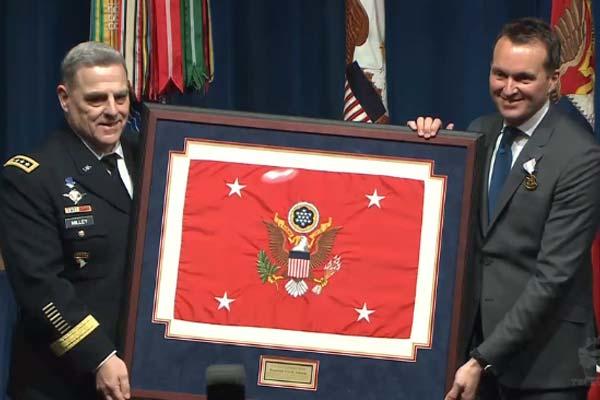Eric Fanning ended his brief but historic tour Wednesday as the 22nd secretary of the Army and the first openly gay service secretary.
"It's been the honor of my lifetime to be your secretary," Fanning told the audience of top Army and Defense Department leaders at a farewell ceremony in a packed Pentagon auditorium.
"Day after day, you deliver" and "I come away a little more in awe of you every time," he said.
Fanning joked about two of the accomplishments of his tenure: "I have never had to testify at a budget hearing" and "I got to see Army beat Navy," ending a 14-year football winning streak last year for the Naval Academy.
He said he was also proud to have been at the Pentagon when the DoD "opened service to those who met the requirements but were denied the opportunity" to serve in the past because of their gender or sexual orientation.
Five years ago, the military ended the "Don't Ask, Don't Tell" policy that barred homosexuals from serving openly. Last year, it opened all military occupational specialties to women.
"It's a sad day for all of us in the Army" as Fanning leaves, Army Chief of Staff Gen. Mark Milley said in his remarks at the ceremony. "We were really privileged to have Eric Fanning as secretary of the Army."
Under Fanning's leadership, the Army has "increased diversity" and "access to the best talent regardless of identity" while "setting the example of a true professional," Milley said in a speech laced with one-liners.
Before pinning Fanning with the Distinguished Public Service award, Milley noted the outgoing secretary's affinity for social media, saying he had ordered up a data check just before the ceremony and found out that while in the job, Fanning had tweeted "801 times and almost as much as a very famous tweeter we're all familiar with."
Milley was referring to President-elect Donald Trump, who has named billionaire businessman Vincent Viola, a West Point graduate and retired Army major, to succeed Fanning.
Milley told Fanning that although he served only 248 days as secretary, "You're still going to get a photograph on the wall." He was referring to the long delay in Fanning's Senate confirmation as Sen. Pat Roberts, a Kansas Republican, put a hold on the nomination.
Roberts relented when he got assurances from the DoD that any prisoners transferred from Guantanamo Bay to the U.S. would not be sent to the military detention facility at Fort Leavenworth, Kansas.
After Fanning's confirmation, Roberts said, "My issue has never been with Mr. Fanning's character, his courage, or his capability. He will be a tremendous leader."
When Fanning was sworn in last May, Chad Griffin, president of the Human Rights Campaign, said in a statement, "Eric Fanning's historic confirmation today as secretary of the U.S. Army is a demonstration of the continued progress toward fairness and equality in our nation's armed forces."
Fanning's career at the Pentagon saw him serve in a variety of management posts in the Army, Navy and Air Force. He was deputy under secretary of the Navy, under secretary and acting secretary of the Air Force, and chief of staff to Defense Secretary Ashton Carter.
When he was finally confirmed by the Senate last year as Army secretary, Fanning summed up why he wanted the job: "It would be my honor to play a role in making sure that the best men and women our country has to offer get all the support they need in undertaking the mission of defending our country, a mission for which they freely volunteered. We ask them to do extraordinary things; we owe them no less."
There were several gifts for Fanning, but Milley saved the best for last: a black football helmet worn by an Army player in the game that ended Navy's streak. The helmet came with a note from Lt. Gen. Robert L. Caslen Jr., superintendent of West Point. The note said in part, "Go Army, Beat Navy."
Editor's note: This story was corrected to replace a reference to "service chief" in both headline and first paragraph.
-- Richard Sisk can be reached at Richard.Sisk@Military.com.





























